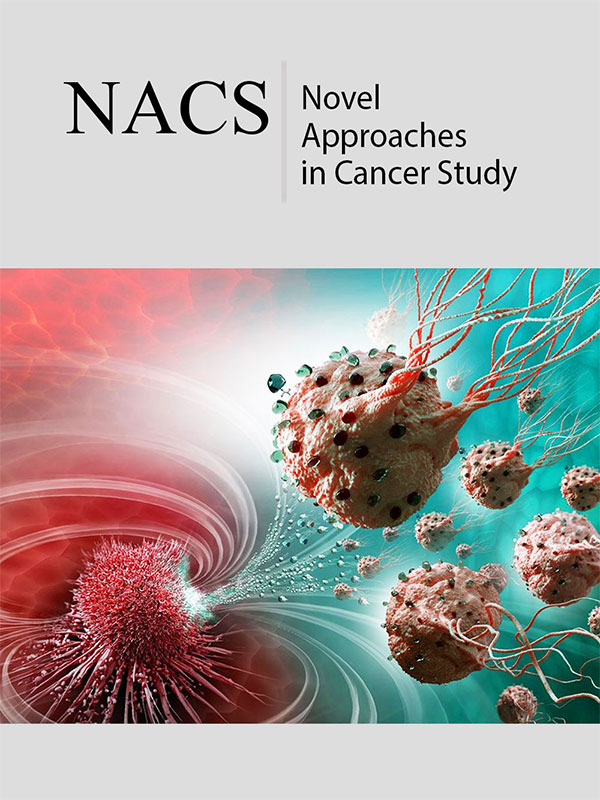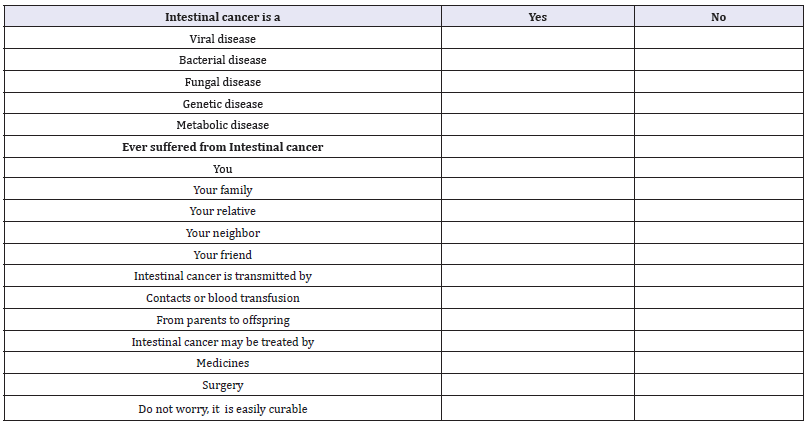- Submissions

Full Text
Novel Approaches in Cancer Study
Awareness about Intestinal Cancer in University Student
Muhammad Imran Qadir*, Saba Ghafoor
Institute of Molecular Biology & Biotechnology, Bahauddin Zakariya University, Pakistan
*Corresponding author:Muhammad Imran Qadir, Institute of Molecular biology & Biotechnology, Bahauddin Zakariya Univesity, Multan, Pakistan
Submission: March 28, 2018;Published: May 03, 2018

ISSN:2637-773XVolume1 Issue3
Abstract
Cancer is a disease which is caused by the uncontrolled growth of cells. The cancer stem cells suggest that the clones are obtained by the sub population of cells showing diverse cancer cells phenotypically. First possible cancer stem cells are seen in leukemia, brain tumors and breast cancer. The gastrointestinal cancer becoming the major causes of deaths in the world. A questionnaire was developed and it is distributed among the students of class to determine the ideas and awareness of this disease. Questionnaires contain 15 different types of question regarding the disease. 39 students taken from the Bahauddin Zakariya University Multan, Pakistan. All the students are post graduated and the results show that all of them have awareness from this disease.
keywords: Cancer stem cells; Gastrointestinal cancer; Questionnaire; Biology; Prevalence; Transmission
Introduction
Cancer is a disease which is caused by the uncontrolled growth of cells. The cancer stem cells suggests that the clones are obtained by the sub population of cells that showing diverse cancer cells phenotypically [1-3]. First possible cancer stem cells are seen in leukemia, [4,5], brain tumors [6] and breast cancer [7,8]. Cancer stem cells some are very important because they have potential for recurrence after treatments like chemotherapy, even majority of cancer cells appear to be killed. Many types of ATP binding cassette (ABC) transporters contribute to resistance against drugs which drawing out from the cell. An example is, resistance protein 1 of breast cancer, a fluorescent dye Hoechst 33342 is drawing out which helps to identify side population (SP) cells which are unlabeled and enrich for stem cells [9]. Evidences taken from the recent studies that cancer SP cells found in glioma cell lines of mouse and neuroblastoma in humans having the capability of both multilineage proliferation and self-renewal , which are responsible for having a in vivo malignancy [10].
The gastrointestinal cancer is becoming the major cause of death in the world which is more powerful then brain tumor and breast cancer. In Japan, gastrointestinal cancers have seven sites of occurrence like pancreas, liver esophagus, colorectal and stomach; these are the top major cancers which are causing deaths worldwide.The basic purpose of this study was to determine the awareness of the biology students about intestinal cancer.
Material and Methods
A questionnaire was developed in a Table 1 and it is distributed among the students of class to determine the ideas and awareness about the disease. Questionnaires contain 15 different types of question regarding the disease. 39 students taken from the Bahauddin Zakariya University Multan, Pakistan in which 6 boys and 33 girls included. The inclusion criteria of students are M.phill and the exclusion students are not at B.S level.
Table 1: Questionnaire to evaluate awareness about etiology of Intestinal cancer..

Results and Discussion
Awareness of post graduate students about biology of intestinal cancer is given in Table 2. The results given in percentages, 31% students accepted that intestinal cancer is viral disease but 69% denied, 67% students accepted that intestinal disease is bacterial disease but 33% denied, 15% students accepted that this disease is fungal disease but 85% denied, 26% students accepted that this disease is genetic disease but 74% denied, 56% students accepted that this disease is due to metabolic disease but 44% denied.
Table 2: Awareness about etiology of Intestinal cancer: Views of Postgraduate Biology Students.

Table 3: Questionnaire to evaluate views about prevalence of Intestinal Cancer.

To check the views about the prevalence of intestinal cancer in Table 3. None of the student suffered from intestinal cancer so result is 0%, 3% students accepted that this disease is present in their family but 97% students denied, no one student’s relative suffered from this disease, 8% students accepted that this disease is present in their neighbor but 92% denied, no one student accepted that this disease is present in their friends.
Table 4: Questionnaire to evaluate views about transmission of intestinal cancer.

To evaluate the views of transmission of intestinal cancer in Table 4. 23% students accepted that this disease is transfer with contact and blood transfusion but 77% students denied, 33% students accepted that this disease is transfer from parents to offspring but 67% students denied from this transmission. To evaluate the views about the treatment from intestinal cancer in Table 5. 85% students accepted that this disease is treated with medicines but 15% students denied, 82%students accepted that this disease is treated with surgery but 18%students denied, 36% students accepted that in this disease there is no need to take tension because it is easily curable but 63% students denied from this that it is easily curable.
Table 5: Questionnaire to evaluate views about transmission of intestinal cancer.

Conclusion
It is concluded from this study that post graduate students are aware from this disease that, the biology of it, transmission and the ways of treatment.
References
- Reya T, Morrison SJ, Clarke MF, Weissman IL (2001) Stem cells, cancer, and cancer stem cells. Nature 414(6859): 105-111.
- Pardal R, Clarke MF, Morrison SJ (2003) Applying the principles of stemcell biology to cancer. Nat Rev Cancer 3(12): 895-902.
- Beachy PA, Karhadkar SS, Berman DM (2004) Tissue repair and stem cell renewal in carcinogenesis. Nature 432(7015): 324-331.
- Wulf GG, Wang RY, Kuehnle I, Weidner D, Marini F, et al. (2001) A leukemic stem cell with intrinsic drug efflux capacity in acute myeloid leukemia. Blood 98(4): 1166-73.
- Bonnet D, Dick JE (1997) Human acute myeloid leukemia is organized as a hierarchy that originates from a primitive hematopoietic cell. Nature medicine 3(7): 730-737.
- Lapidot T, Sirard C, Vormoor J, Murdoch B, Hoang T, et al. (1994) A cell initiating human acute myeloid leukaemia after transplantation into SCID mice. Nature 367: 645-648.
- Al-Hajj M, Wicha MS, Benito-Hernandez A, Morrison SJ, Clarke MF (2003) Prospective identification of tumorigenic breast cancer cells. Proc Natl Acad Sci U S A 100(7): 3983-3988.
- Goodell MA, Rosenzweig M, Kim H, Marks DF, DeMaria M, et al. (1997) Dye efflux studies suggest that hematopoietic stem cells expressing low or undetectable levels of CD34 antigen exist in multiple species. Nature medicine 3: 1337-1345.
- Hirschmann-Jax C, Foster AE, Wulf GG, Nuchtern JG, Jax TW, et al. (2004) A distinct “side population” of cells with high drug efflux capacity in human tumor cells. Proc Natl Acad Sci U S A 101(39): 14228-14233.
- Kondo T, Setoguchi T, Taga T (2004) Persistence of a small subpopulation of cancer stem-like cells in the C6 glioma cell line. Proc Natl Acad Sci U S A 101(3): 781-786.
© 2018 Muhammad Imran Qadir. This is an open access article distributed under the terms of the Creative Commons Attribution License , which permits unrestricted use, distribution, and build upon your work non-commercially.
 a Creative Commons Attribution 4.0 International License. Based on a work at www.crimsonpublishers.com.
Best viewed in
a Creative Commons Attribution 4.0 International License. Based on a work at www.crimsonpublishers.com.
Best viewed in 







.jpg)






























 Editorial Board Registrations
Editorial Board Registrations Submit your Article
Submit your Article Refer a Friend
Refer a Friend Advertise With Us
Advertise With Us
.jpg)






.jpg)














.bmp)
.jpg)
.png)
.jpg)










.jpg)






.png)

.png)



.png)






